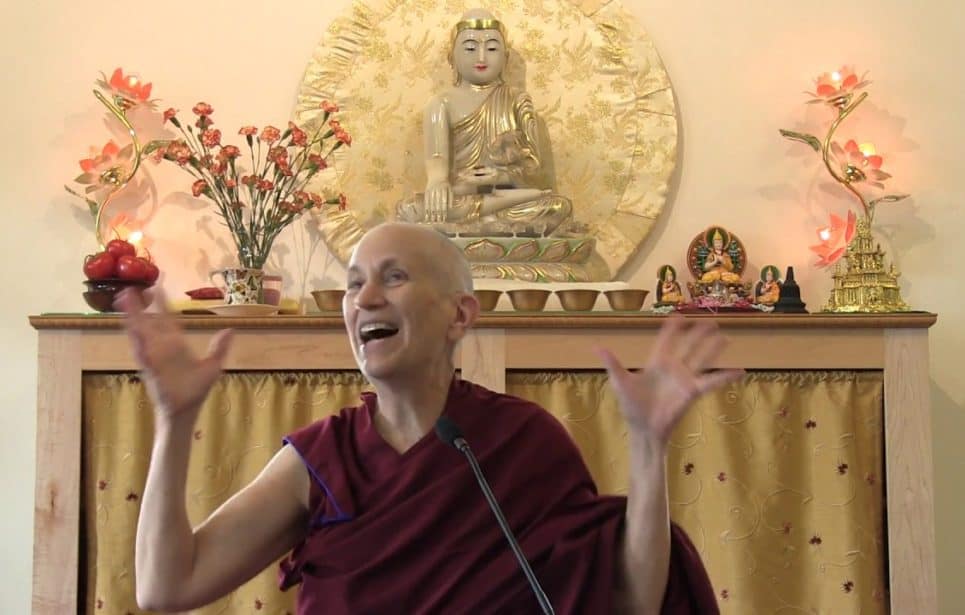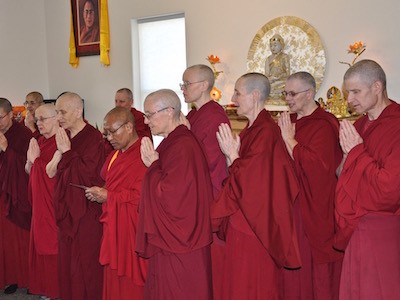Purpose of a monastery

During a daily Bodhisattva’s Breakfast Corner (BBCorner) talk, Sravasti Abbey abbess Venerable Thubten Chodron invited the Abbey community—both resident and those afar—to reflect on the question: “What’s the purpose of a monastery?”

The primary purpose of a monastery is to transform our minds. (Photo by Sravasti Abbey)
“The primary purpose,” she said, “is to transform our minds,” which the structure of monastery life seeks to accomplish in three ways:
- Studying and teaching the Dharma
- Meditation
- Offering service
Each aspect contributes to our progress towards full awakening. Further, practicing each one of these three aspects affects each of the others.
Reflection: The purpose of a monastery
At the end of the talk, Venerable Chodron gave us some homework. She asked the community to contemplate the interplay between these three key aspects of day-to-day life in the monastery. (You can watch the BBCorner here.)
- How does studying the Dharma affect your meditation? Your offering service?
- How does your meditation affect your offering service? Your study?
- How does offering service affect your meditation? Your study?
The next week, during another teaching, Venerable Chodron asked us to share our reflections. Here are some of our thoughts. (You can watch the full discussion here.)
How do study and teaching the Dharma help you with your meditation and offering service?
Venerable Losang: Studying gives me the context for what I am going to meditate on. I forget which teacher said this, but students would come and say they wanted to do silent retreat. He replied, “What are you going to meditate on? You don’t know anything!”
I did a lot of sitting meditation for a long time. It was sporadic, and it was also uninformed. I didn’t really have a Buddhist world view. When I started coming here to the Abbey, it was very helpful to me, especially learning the lamrim (stages of the path teachings). The lamrim teachings give direction about what to think and on working with the mind. By meditating on those, I can really try and transform my mind.
I’ve been thinking on how offering service benefits the mind. I think it has a lot to do with what mind we bring to it. We could be thinking, “This is a chance to create merit;” we could approach the task with a mind of acceptance and humility. Or we can approach it with, “Why am I doing this? This is beneath me. I could be doing this or that. Why are they telling me what to do?” Then we’re really missing a chance to get a lot out of it.
Venerable Thubten Chodron: So offering service can help with transforming the mind?
Venerable Losang: It can be if we use it that way. A hammer can hammer a nail, but you have to be using it that way.
How do study and teaching affect your offering service?
Venerable Semkye: I think the most powerful thing is it deepens my refuge. When I think, “I am offering service to the Buddha, Dharma, and Sangha,” it is not about the list, or that someone says it has to be done. I am doing it for the Buddha, Dharma, and Sangha. That changes my perspective. That motivation is much more powerful than list planning and doing things because I have to.
It also deepens my refuge by connecting what I do—offering service—to what I take refuge in, so I am connecting much more strongly. It also brings joy because I’m able to let go of the self-centered thought—all the agendas, all of the bias of what I like to do and don’t like to do. As long as I am offering my service to the Three Jewels, it levels the playing field for me,
Venerable Nyima: For me, offering service is where I get to test and see whether what I’m learning and working on is actually having an effect on my mind. If I understand what I’m studying and listening to correctly, then that should help me to interact in a more positive way with the people around me and with what I am doing. When I see that this is happening, I know my study is having a positive effect.
Conversely, if I am struggling with those interactions, struggling with certain aspects of offering service, then I can go back to study and say, “How can I inform what I am doing with study and listening, so that I can transform the experience I am having in offering service?”
Of course, the study and the listening is not going to have an immediate effect unless I contemplate and meditate on it. This can deepen my understanding and transform my behavior, attitude, and approach.
Venerable Tarpa: Study, especially early on, helped me to get rid of my confusion about ethics. Society has certain norms that are actually unethical but are widely accepted. The teachings on the ten destructive actions helped me to get rid of confusion about how to be when I offer service and work with other people.
Venerable Chonyi: Study and reflection has also helped me create the context for offering service. The more deeply I understand impermanence and dependent arising, the more lightly I can hold the work that I am doing. I can give it more focus because I realize I am simply creating causes, and I don’t attach so tightly to either the outcomes or my ideas about how things need to be done. Then I have more capacity, because I am not hanging on to any piece of it.
How does offering service influence your study?
Venerable Tsepal: Something I’ve noticed since coming to the Abbey is the extra focus on offering service and the intention with which we do it here. In that way, whatever bit of study I can do becomes much richer. Although there may not be as many hours put into study, the study that I have is very fruitful and I appreciate that. I link it with creating merit.
Venerable Jigme: Offering service often reminds me about the opportunity that I have here and that I could be in many other places in not a good situation. So, it just makes me humble. When I do offering service activities here, if I put my mind to them properly, they are virtuous and beneficial.
Venerable Thubten Chodron: I think also that when we offer service we create merit. That merit then fertilizes our mind so that when we study, the teachings go in on a different level. Maybe this is relating to what you were saying Venerable Tsepal?
Venerable Tarpa: Yes, I agree about the merit. I didn’t believe in that before I lived here so much, but now I do—which is a big change. Another thing is that our offering services helps to create the opportunities we have here—to have this Abbey, to receive so many teachings, and to spend our time in a virtuous way.
Venerable Thubten Chodron: That’s true. We should not forget that. It is because we offer service that the Abbey can exist so that we can have the teachings.
Venerable Nyima: I have experienced that the combination of meditation, offering service, study, and sharing the Dharma has increased my capacity to handle things that come my way. I would not have been able to do that as well before. I have gained flexibility and quickness of mind. I’ve increased my ability to shift from one approach to the other, one activity to the other, on a dime and almost seamlessly. I think that is a result of our schedule, of what we do here and how we do it. It is very beneficial. My mind is less hung up on, “Now I have to switch gears; now I have to do that.”
Anagarika Christina: I’ve come to see offering service as a great opportunity to practice generosity. Living here, I feel we are always doing something for the collective or guests. Taking good care of guests is not something I was used to doing. I see that as a big growth area for me—opening my heart to all guests. Also, I’m learning to let go of the outcome. The thought, “This is my work,” doesn’t really work here. I have to think, “This is for the Abbey, for the Sangha.” It’s not just for me and my reputation.
Venerable Losang: I find that study and reflection help my meditation, offering service, and daily mundane tasks, in the way it helps to inspire me. Even reading material that I have already read renews the Dharma ideas in my mind. It renews and inspires my motivation: “Today I am going to approach the day with a positive mind for a positive reason.”
Venerable Thubten Chodron: Yes, it makes the mind happy.
And what about you?
The community learned much from contemplating these questions as we explored the purpose of a monastery. Regardless of where you live and practice, we encourage you to think about these questions too.
Sravasti Abbey Monastics
The monastics of Sravasti Abbey endeavor to live generously through dedicating their lives to the Buddha's teachings, practicing them earnestly, and offering them to others. They live simply, as the Buddha did, and offer a model for society at large, showing that ethical discipline contributes to a morally grounded society. Through actively developing their own qualities of loving-kindness, compassion, and wisdom, the monastics aspire to make Sravasti Abbey a beacon for peace in our conflict-torn world. Learn more about monastic life here...


